Report on Equality, Diversity, and Fair Treatment in the Workplace
VerifiedAdded on 2023/06/09
|8
|2805
|438
Report
AI Summary
This report delves into the crucial concepts of equality, diversity, and fair treatment within the employment context, particularly focusing on the public service sector represented by UNISON. It examines the key concepts, including equality of outcome, opportunity, and process, as well as the multifaceted nature of diversity encompassing cultural, racial, and other forms of variance. The report analyzes the importance of these principles, emphasizing equal opportunities, and the benefits of a diverse workforce. It reviews relevant legislation like the Equality Act 2010, the Equality and Human Rights Commission, and other acts, evaluating their effectiveness in promoting a fair and inclusive workplace. Furthermore, it explores the role of advisory services in fostering diversification and ensuring fair treatment, while also highlighting the benefits of these practices for public service workers. The report concludes by underscoring the significance of equality, diversity, and fair treatment for organizational success and employee well-being.
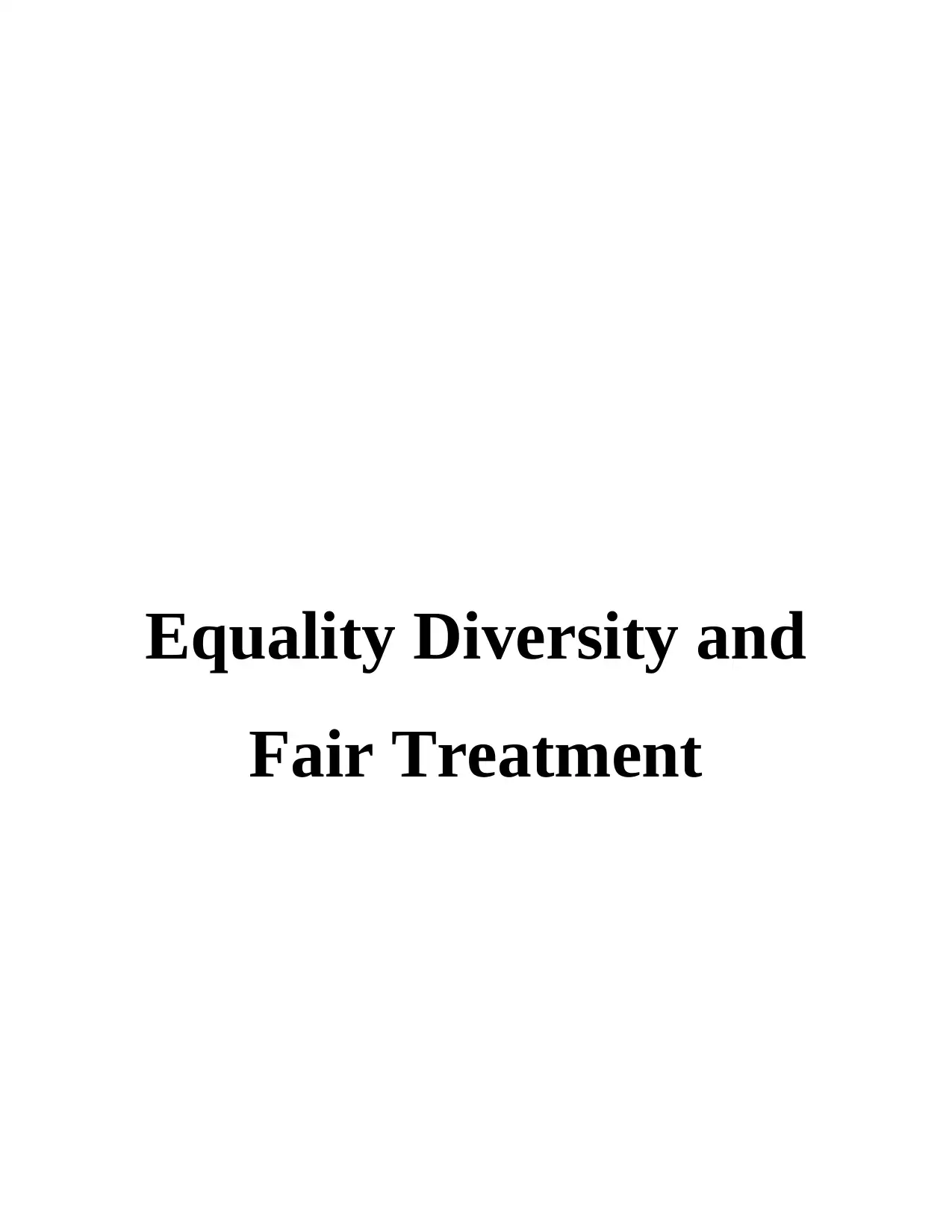
Equality Diversity and
Fair Treatment
Fair Treatment
Paraphrase This Document
Need a fresh take? Get an instant paraphrase of this document with our AI Paraphraser
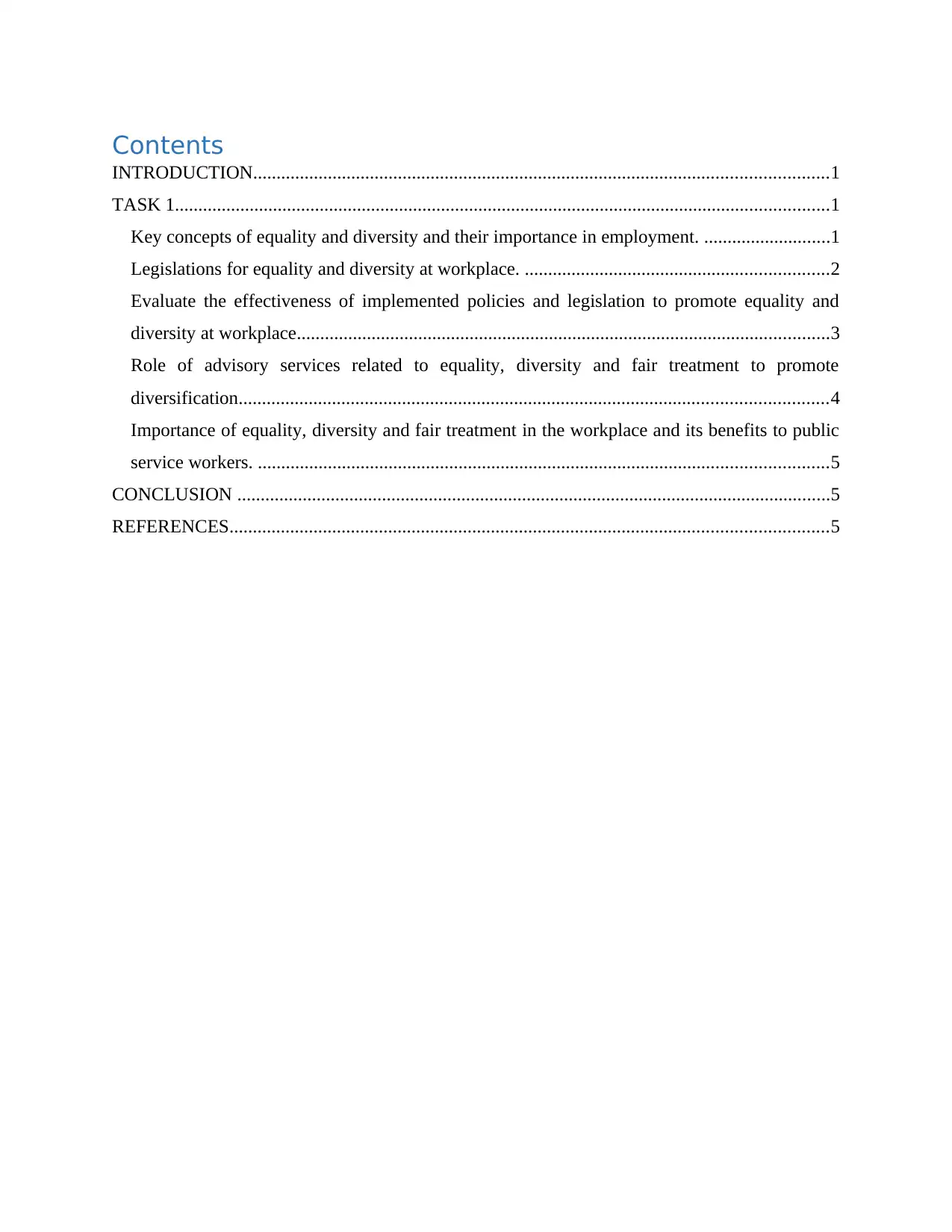
Contents
INTRODUCTION...........................................................................................................................1
TASK 1............................................................................................................................................1
Key concepts of equality and diversity and their importance in employment. ...........................1
Legislations for equality and diversity at workplace. .................................................................2
Evaluate the effectiveness of implemented policies and legislation to promote equality and
diversity at workplace..................................................................................................................3
Role of advisory services related to equality, diversity and fair treatment to promote
diversification..............................................................................................................................4
Importance of equality, diversity and fair treatment in the workplace and its benefits to public
service workers. ..........................................................................................................................5
CONCLUSION ...............................................................................................................................5
REFERENCES................................................................................................................................5
INTRODUCTION...........................................................................................................................1
TASK 1............................................................................................................................................1
Key concepts of equality and diversity and their importance in employment. ...........................1
Legislations for equality and diversity at workplace. .................................................................2
Evaluate the effectiveness of implemented policies and legislation to promote equality and
diversity at workplace..................................................................................................................3
Role of advisory services related to equality, diversity and fair treatment to promote
diversification..............................................................................................................................4
Importance of equality, diversity and fair treatment in the workplace and its benefits to public
service workers. ..........................................................................................................................5
CONCLUSION ...............................................................................................................................5
REFERENCES................................................................................................................................5
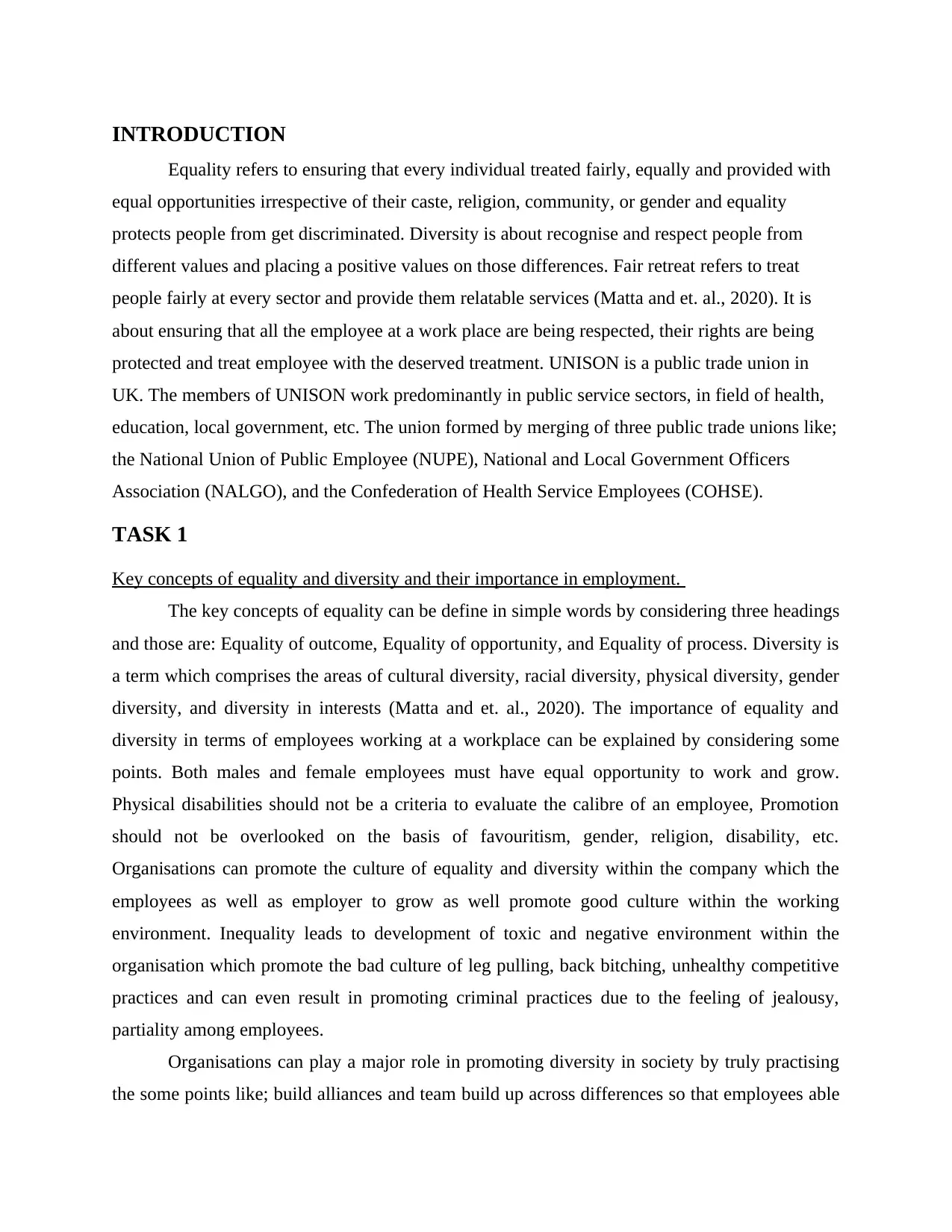
INTRODUCTION
Equality refers to ensuring that every individual treated fairly, equally and provided with
equal opportunities irrespective of their caste, religion, community, or gender and equality
protects people from get discriminated. Diversity is about recognise and respect people from
different values and placing a positive values on those differences. Fair retreat refers to treat
people fairly at every sector and provide them relatable services (Matta and et. al., 2020). It is
about ensuring that all the employee at a work place are being respected, their rights are being
protected and treat employee with the deserved treatment. UNISON is a public trade union in
UK. The members of UNISON work predominantly in public service sectors, in field of health,
education, local government, etc. The union formed by merging of three public trade unions like;
the National Union of Public Employee (NUPE), National and Local Government Officers
Association (NALGO), and the Confederation of Health Service Employees (COHSE).
TASK 1
Key concepts of equality and diversity and their importance in employment.
The key concepts of equality can be define in simple words by considering three headings
and those are: Equality of outcome, Equality of opportunity, and Equality of process. Diversity is
a term which comprises the areas of cultural diversity, racial diversity, physical diversity, gender
diversity, and diversity in interests (Matta and et. al., 2020). The importance of equality and
diversity in terms of employees working at a workplace can be explained by considering some
points. Both males and female employees must have equal opportunity to work and grow.
Physical disabilities should not be a criteria to evaluate the calibre of an employee, Promotion
should not be overlooked on the basis of favouritism, gender, religion, disability, etc.
Organisations can promote the culture of equality and diversity within the company which the
employees as well as employer to grow as well promote good culture within the working
environment. Inequality leads to development of toxic and negative environment within the
organisation which promote the bad culture of leg pulling, back bitching, unhealthy competitive
practices and can even result in promoting criminal practices due to the feeling of jealousy,
partiality among employees.
Organisations can play a major role in promoting diversity in society by truly practising
the some points like; build alliances and team build up across differences so that employees able
Equality refers to ensuring that every individual treated fairly, equally and provided with
equal opportunities irrespective of their caste, religion, community, or gender and equality
protects people from get discriminated. Diversity is about recognise and respect people from
different values and placing a positive values on those differences. Fair retreat refers to treat
people fairly at every sector and provide them relatable services (Matta and et. al., 2020). It is
about ensuring that all the employee at a work place are being respected, their rights are being
protected and treat employee with the deserved treatment. UNISON is a public trade union in
UK. The members of UNISON work predominantly in public service sectors, in field of health,
education, local government, etc. The union formed by merging of three public trade unions like;
the National Union of Public Employee (NUPE), National and Local Government Officers
Association (NALGO), and the Confederation of Health Service Employees (COHSE).
TASK 1
Key concepts of equality and diversity and their importance in employment.
The key concepts of equality can be define in simple words by considering three headings
and those are: Equality of outcome, Equality of opportunity, and Equality of process. Diversity is
a term which comprises the areas of cultural diversity, racial diversity, physical diversity, gender
diversity, and diversity in interests (Matta and et. al., 2020). The importance of equality and
diversity in terms of employees working at a workplace can be explained by considering some
points. Both males and female employees must have equal opportunity to work and grow.
Physical disabilities should not be a criteria to evaluate the calibre of an employee, Promotion
should not be overlooked on the basis of favouritism, gender, religion, disability, etc.
Organisations can promote the culture of equality and diversity within the company which the
employees as well as employer to grow as well promote good culture within the working
environment. Inequality leads to development of toxic and negative environment within the
organisation which promote the bad culture of leg pulling, back bitching, unhealthy competitive
practices and can even result in promoting criminal practices due to the feeling of jealousy,
partiality among employees.
Organisations can play a major role in promoting diversity in society by truly practising
the some points like; build alliances and team build up across differences so that employees able
⊘ This is a preview!⊘
Do you want full access?
Subscribe today to unlock all pages.

Trusted by 1+ million students worldwide
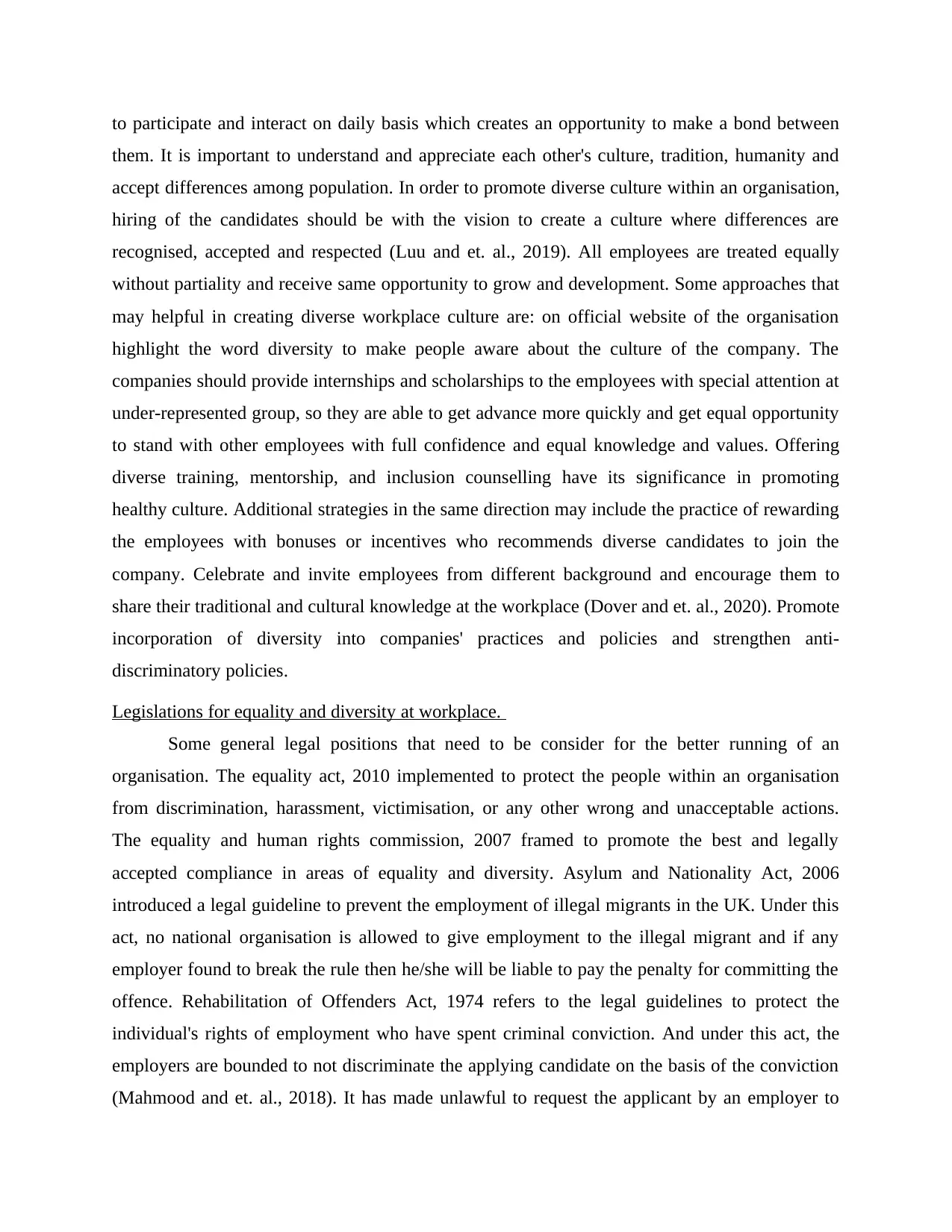
to participate and interact on daily basis which creates an opportunity to make a bond between
them. It is important to understand and appreciate each other's culture, tradition, humanity and
accept differences among population. In order to promote diverse culture within an organisation,
hiring of the candidates should be with the vision to create a culture where differences are
recognised, accepted and respected (Luu and et. al., 2019). All employees are treated equally
without partiality and receive same opportunity to grow and development. Some approaches that
may helpful in creating diverse workplace culture are: on official website of the organisation
highlight the word diversity to make people aware about the culture of the company. The
companies should provide internships and scholarships to the employees with special attention at
under-represented group, so they are able to get advance more quickly and get equal opportunity
to stand with other employees with full confidence and equal knowledge and values. Offering
diverse training, mentorship, and inclusion counselling have its significance in promoting
healthy culture. Additional strategies in the same direction may include the practice of rewarding
the employees with bonuses or incentives who recommends diverse candidates to join the
company. Celebrate and invite employees from different background and encourage them to
share their traditional and cultural knowledge at the workplace (Dover and et. al., 2020). Promote
incorporation of diversity into companies' practices and policies and strengthen anti-
discriminatory policies.
Legislations for equality and diversity at workplace.
Some general legal positions that need to be consider for the better running of an
organisation. The equality act, 2010 implemented to protect the people within an organisation
from discrimination, harassment, victimisation, or any other wrong and unacceptable actions.
The equality and human rights commission, 2007 framed to promote the best and legally
accepted compliance in areas of equality and diversity. Asylum and Nationality Act, 2006
introduced a legal guideline to prevent the employment of illegal migrants in the UK. Under this
act, no national organisation is allowed to give employment to the illegal migrant and if any
employer found to break the rule then he/she will be liable to pay the penalty for committing the
offence. Rehabilitation of Offenders Act, 1974 refers to the legal guidelines to protect the
individual's rights of employment who have spent criminal conviction. And under this act, the
employers are bounded to not discriminate the applying candidate on the basis of the conviction
(Mahmood and et. al., 2018). It has made unlawful to request the applicant by an employer to
them. It is important to understand and appreciate each other's culture, tradition, humanity and
accept differences among population. In order to promote diverse culture within an organisation,
hiring of the candidates should be with the vision to create a culture where differences are
recognised, accepted and respected (Luu and et. al., 2019). All employees are treated equally
without partiality and receive same opportunity to grow and development. Some approaches that
may helpful in creating diverse workplace culture are: on official website of the organisation
highlight the word diversity to make people aware about the culture of the company. The
companies should provide internships and scholarships to the employees with special attention at
under-represented group, so they are able to get advance more quickly and get equal opportunity
to stand with other employees with full confidence and equal knowledge and values. Offering
diverse training, mentorship, and inclusion counselling have its significance in promoting
healthy culture. Additional strategies in the same direction may include the practice of rewarding
the employees with bonuses or incentives who recommends diverse candidates to join the
company. Celebrate and invite employees from different background and encourage them to
share their traditional and cultural knowledge at the workplace (Dover and et. al., 2020). Promote
incorporation of diversity into companies' practices and policies and strengthen anti-
discriminatory policies.
Legislations for equality and diversity at workplace.
Some general legal positions that need to be consider for the better running of an
organisation. The equality act, 2010 implemented to protect the people within an organisation
from discrimination, harassment, victimisation, or any other wrong and unacceptable actions.
The equality and human rights commission, 2007 framed to promote the best and legally
accepted compliance in areas of equality and diversity. Asylum and Nationality Act, 2006
introduced a legal guideline to prevent the employment of illegal migrants in the UK. Under this
act, no national organisation is allowed to give employment to the illegal migrant and if any
employer found to break the rule then he/she will be liable to pay the penalty for committing the
offence. Rehabilitation of Offenders Act, 1974 refers to the legal guidelines to protect the
individual's rights of employment who have spent criminal conviction. And under this act, the
employers are bounded to not discriminate the applying candidate on the basis of the conviction
(Mahmood and et. al., 2018). It has made unlawful to request the applicant by an employer to
Paraphrase This Document
Need a fresh take? Get an instant paraphrase of this document with our AI Paraphraser
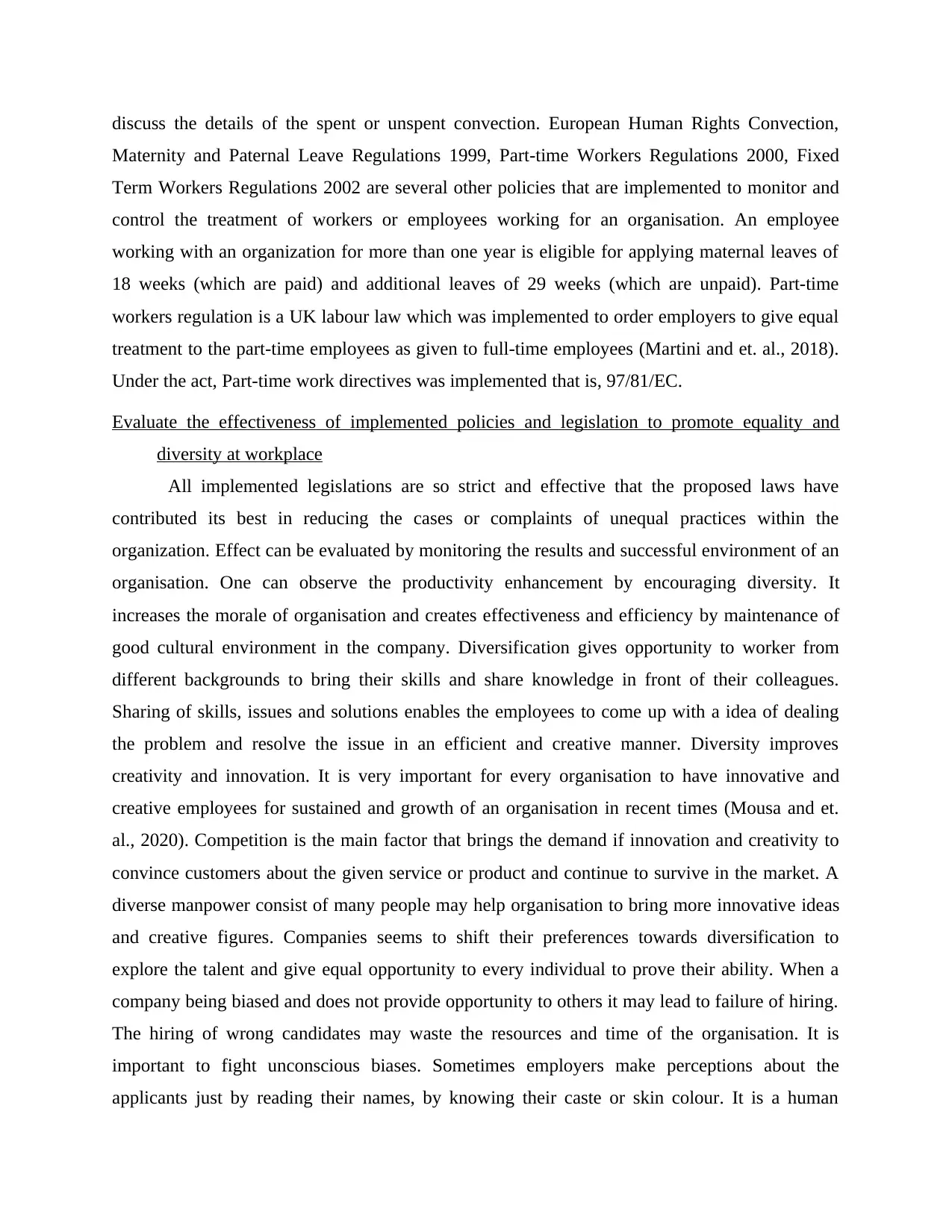
discuss the details of the spent or unspent convection. European Human Rights Convection,
Maternity and Paternal Leave Regulations 1999, Part-time Workers Regulations 2000, Fixed
Term Workers Regulations 2002 are several other policies that are implemented to monitor and
control the treatment of workers or employees working for an organisation. An employee
working with an organization for more than one year is eligible for applying maternal leaves of
18 weeks (which are paid) and additional leaves of 29 weeks (which are unpaid). Part-time
workers regulation is a UK labour law which was implemented to order employers to give equal
treatment to the part-time employees as given to full-time employees (Martini and et. al., 2018).
Under the act, Part-time work directives was implemented that is, 97/81/EC.
Evaluate the effectiveness of implemented policies and legislation to promote equality and
diversity at workplace
All implemented legislations are so strict and effective that the proposed laws have
contributed its best in reducing the cases or complaints of unequal practices within the
organization. Effect can be evaluated by monitoring the results and successful environment of an
organisation. One can observe the productivity enhancement by encouraging diversity. It
increases the morale of organisation and creates effectiveness and efficiency by maintenance of
good cultural environment in the company. Diversification gives opportunity to worker from
different backgrounds to bring their skills and share knowledge in front of their colleagues.
Sharing of skills, issues and solutions enables the employees to come up with a idea of dealing
the problem and resolve the issue in an efficient and creative manner. Diversity improves
creativity and innovation. It is very important for every organisation to have innovative and
creative employees for sustained and growth of an organisation in recent times (Mousa and et.
al., 2020). Competition is the main factor that brings the demand if innovation and creativity to
convince customers about the given service or product and continue to survive in the market. A
diverse manpower consist of many people may help organisation to bring more innovative ideas
and creative figures. Companies seems to shift their preferences towards diversification to
explore the talent and give equal opportunity to every individual to prove their ability. When a
company being biased and does not provide opportunity to others it may lead to failure of hiring.
The hiring of wrong candidates may waste the resources and time of the organisation. It is
important to fight unconscious biases. Sometimes employers make perceptions about the
applicants just by reading their names, by knowing their caste or skin colour. It is a human
Maternity and Paternal Leave Regulations 1999, Part-time Workers Regulations 2000, Fixed
Term Workers Regulations 2002 are several other policies that are implemented to monitor and
control the treatment of workers or employees working for an organisation. An employee
working with an organization for more than one year is eligible for applying maternal leaves of
18 weeks (which are paid) and additional leaves of 29 weeks (which are unpaid). Part-time
workers regulation is a UK labour law which was implemented to order employers to give equal
treatment to the part-time employees as given to full-time employees (Martini and et. al., 2018).
Under the act, Part-time work directives was implemented that is, 97/81/EC.
Evaluate the effectiveness of implemented policies and legislation to promote equality and
diversity at workplace
All implemented legislations are so strict and effective that the proposed laws have
contributed its best in reducing the cases or complaints of unequal practices within the
organization. Effect can be evaluated by monitoring the results and successful environment of an
organisation. One can observe the productivity enhancement by encouraging diversity. It
increases the morale of organisation and creates effectiveness and efficiency by maintenance of
good cultural environment in the company. Diversification gives opportunity to worker from
different backgrounds to bring their skills and share knowledge in front of their colleagues.
Sharing of skills, issues and solutions enables the employees to come up with a idea of dealing
the problem and resolve the issue in an efficient and creative manner. Diversity improves
creativity and innovation. It is very important for every organisation to have innovative and
creative employees for sustained and growth of an organisation in recent times (Mousa and et.
al., 2020). Competition is the main factor that brings the demand if innovation and creativity to
convince customers about the given service or product and continue to survive in the market. A
diverse manpower consist of many people may help organisation to bring more innovative ideas
and creative figures. Companies seems to shift their preferences towards diversification to
explore the talent and give equal opportunity to every individual to prove their ability. When a
company being biased and does not provide opportunity to others it may lead to failure of hiring.
The hiring of wrong candidates may waste the resources and time of the organisation. It is
important to fight unconscious biases. Sometimes employers make perceptions about the
applicants just by reading their names, by knowing their caste or skin colour. It is a human
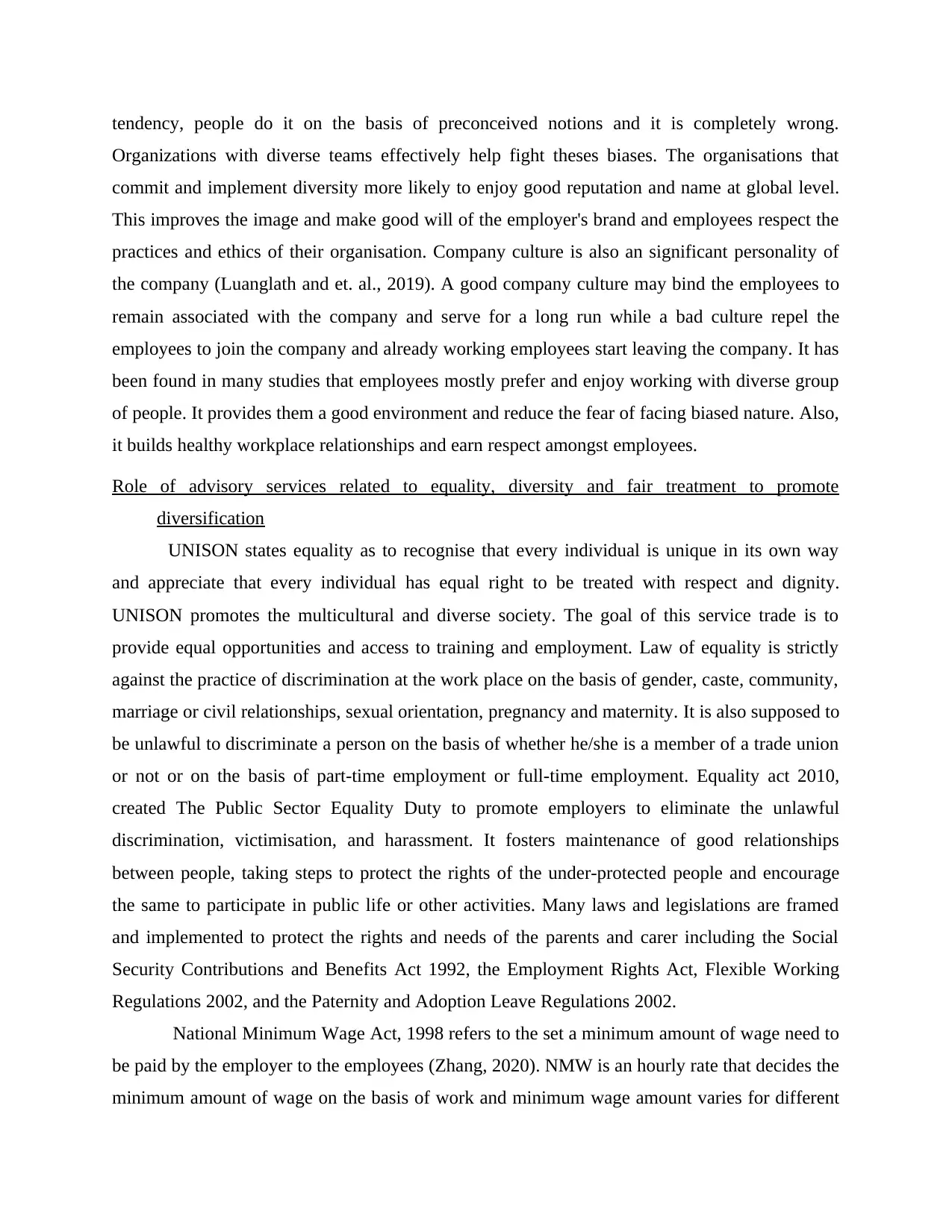
tendency, people do it on the basis of preconceived notions and it is completely wrong.
Organizations with diverse teams effectively help fight theses biases. The organisations that
commit and implement diversity more likely to enjoy good reputation and name at global level.
This improves the image and make good will of the employer's brand and employees respect the
practices and ethics of their organisation. Company culture is also an significant personality of
the company (Luanglath and et. al., 2019). A good company culture may bind the employees to
remain associated with the company and serve for a long run while a bad culture repel the
employees to join the company and already working employees start leaving the company. It has
been found in many studies that employees mostly prefer and enjoy working with diverse group
of people. It provides them a good environment and reduce the fear of facing biased nature. Also,
it builds healthy workplace relationships and earn respect amongst employees.
Role of advisory services related to equality, diversity and fair treatment to promote
diversification
UNISON states equality as to recognise that every individual is unique in its own way
and appreciate that every individual has equal right to be treated with respect and dignity.
UNISON promotes the multicultural and diverse society. The goal of this service trade is to
provide equal opportunities and access to training and employment. Law of equality is strictly
against the practice of discrimination at the work place on the basis of gender, caste, community,
marriage or civil relationships, sexual orientation, pregnancy and maternity. It is also supposed to
be unlawful to discriminate a person on the basis of whether he/she is a member of a trade union
or not or on the basis of part-time employment or full-time employment. Equality act 2010,
created The Public Sector Equality Duty to promote employers to eliminate the unlawful
discrimination, victimisation, and harassment. It fosters maintenance of good relationships
between people, taking steps to protect the rights of the under-protected people and encourage
the same to participate in public life or other activities. Many laws and legislations are framed
and implemented to protect the rights and needs of the parents and carer including the Social
Security Contributions and Benefits Act 1992, the Employment Rights Act, Flexible Working
Regulations 2002, and the Paternity and Adoption Leave Regulations 2002.
National Minimum Wage Act, 1998 refers to the set a minimum amount of wage need to
be paid by the employer to the employees (Zhang, 2020). NMW is an hourly rate that decides the
minimum amount of wage on the basis of work and minimum wage amount varies for different
Organizations with diverse teams effectively help fight theses biases. The organisations that
commit and implement diversity more likely to enjoy good reputation and name at global level.
This improves the image and make good will of the employer's brand and employees respect the
practices and ethics of their organisation. Company culture is also an significant personality of
the company (Luanglath and et. al., 2019). A good company culture may bind the employees to
remain associated with the company and serve for a long run while a bad culture repel the
employees to join the company and already working employees start leaving the company. It has
been found in many studies that employees mostly prefer and enjoy working with diverse group
of people. It provides them a good environment and reduce the fear of facing biased nature. Also,
it builds healthy workplace relationships and earn respect amongst employees.
Role of advisory services related to equality, diversity and fair treatment to promote
diversification
UNISON states equality as to recognise that every individual is unique in its own way
and appreciate that every individual has equal right to be treated with respect and dignity.
UNISON promotes the multicultural and diverse society. The goal of this service trade is to
provide equal opportunities and access to training and employment. Law of equality is strictly
against the practice of discrimination at the work place on the basis of gender, caste, community,
marriage or civil relationships, sexual orientation, pregnancy and maternity. It is also supposed to
be unlawful to discriminate a person on the basis of whether he/she is a member of a trade union
or not or on the basis of part-time employment or full-time employment. Equality act 2010,
created The Public Sector Equality Duty to promote employers to eliminate the unlawful
discrimination, victimisation, and harassment. It fosters maintenance of good relationships
between people, taking steps to protect the rights of the under-protected people and encourage
the same to participate in public life or other activities. Many laws and legislations are framed
and implemented to protect the rights and needs of the parents and carer including the Social
Security Contributions and Benefits Act 1992, the Employment Rights Act, Flexible Working
Regulations 2002, and the Paternity and Adoption Leave Regulations 2002.
National Minimum Wage Act, 1998 refers to the set a minimum amount of wage need to
be paid by the employer to the employees (Zhang, 2020). NMW is an hourly rate that decides the
minimum amount of wage on the basis of work and minimum wage amount varies for different
⊘ This is a preview!⊘
Do you want full access?
Subscribe today to unlock all pages.

Trusted by 1+ million students worldwide
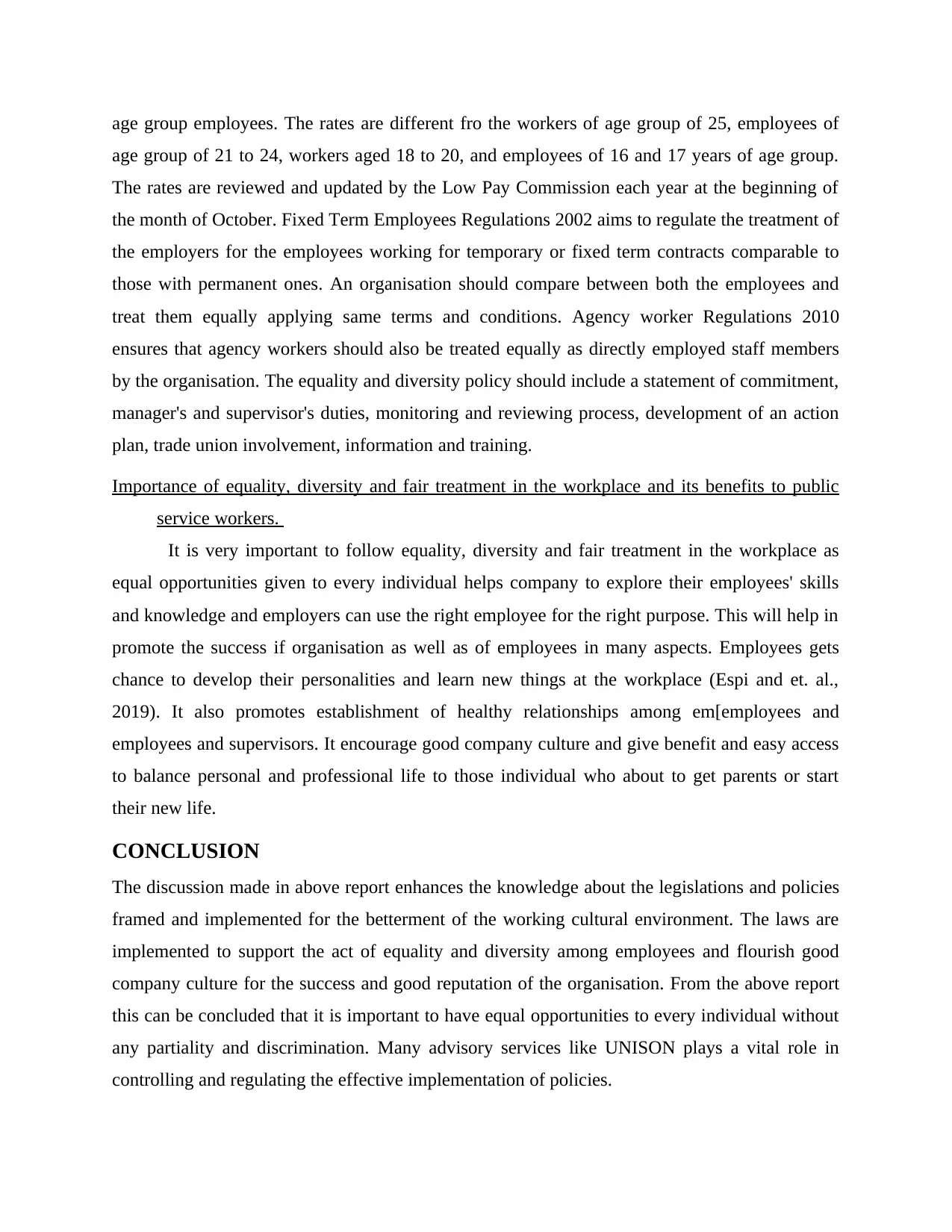
age group employees. The rates are different fro the workers of age group of 25, employees of
age group of 21 to 24, workers aged 18 to 20, and employees of 16 and 17 years of age group.
The rates are reviewed and updated by the Low Pay Commission each year at the beginning of
the month of October. Fixed Term Employees Regulations 2002 aims to regulate the treatment of
the employers for the employees working for temporary or fixed term contracts comparable to
those with permanent ones. An organisation should compare between both the employees and
treat them equally applying same terms and conditions. Agency worker Regulations 2010
ensures that agency workers should also be treated equally as directly employed staff members
by the organisation. The equality and diversity policy should include a statement of commitment,
manager's and supervisor's duties, monitoring and reviewing process, development of an action
plan, trade union involvement, information and training.
Importance of equality, diversity and fair treatment in the workplace and its benefits to public
service workers.
It is very important to follow equality, diversity and fair treatment in the workplace as
equal opportunities given to every individual helps company to explore their employees' skills
and knowledge and employers can use the right employee for the right purpose. This will help in
promote the success if organisation as well as of employees in many aspects. Employees gets
chance to develop their personalities and learn new things at the workplace (Espi and et. al.,
2019). It also promotes establishment of healthy relationships among em[employees and
employees and supervisors. It encourage good company culture and give benefit and easy access
to balance personal and professional life to those individual who about to get parents or start
their new life.
CONCLUSION
The discussion made in above report enhances the knowledge about the legislations and policies
framed and implemented for the betterment of the working cultural environment. The laws are
implemented to support the act of equality and diversity among employees and flourish good
company culture for the success and good reputation of the organisation. From the above report
this can be concluded that it is important to have equal opportunities to every individual without
any partiality and discrimination. Many advisory services like UNISON plays a vital role in
controlling and regulating the effective implementation of policies.
age group of 21 to 24, workers aged 18 to 20, and employees of 16 and 17 years of age group.
The rates are reviewed and updated by the Low Pay Commission each year at the beginning of
the month of October. Fixed Term Employees Regulations 2002 aims to regulate the treatment of
the employers for the employees working for temporary or fixed term contracts comparable to
those with permanent ones. An organisation should compare between both the employees and
treat them equally applying same terms and conditions. Agency worker Regulations 2010
ensures that agency workers should also be treated equally as directly employed staff members
by the organisation. The equality and diversity policy should include a statement of commitment,
manager's and supervisor's duties, monitoring and reviewing process, development of an action
plan, trade union involvement, information and training.
Importance of equality, diversity and fair treatment in the workplace and its benefits to public
service workers.
It is very important to follow equality, diversity and fair treatment in the workplace as
equal opportunities given to every individual helps company to explore their employees' skills
and knowledge and employers can use the right employee for the right purpose. This will help in
promote the success if organisation as well as of employees in many aspects. Employees gets
chance to develop their personalities and learn new things at the workplace (Espi and et. al.,
2019). It also promotes establishment of healthy relationships among em[employees and
employees and supervisors. It encourage good company culture and give benefit and easy access
to balance personal and professional life to those individual who about to get parents or start
their new life.
CONCLUSION
The discussion made in above report enhances the knowledge about the legislations and policies
framed and implemented for the betterment of the working cultural environment. The laws are
implemented to support the act of equality and diversity among employees and flourish good
company culture for the success and good reputation of the organisation. From the above report
this can be concluded that it is important to have equal opportunities to every individual without
any partiality and discrimination. Many advisory services like UNISON plays a vital role in
controlling and regulating the effective implementation of policies.
Paraphrase This Document
Need a fresh take? Get an instant paraphrase of this document with our AI Paraphraser
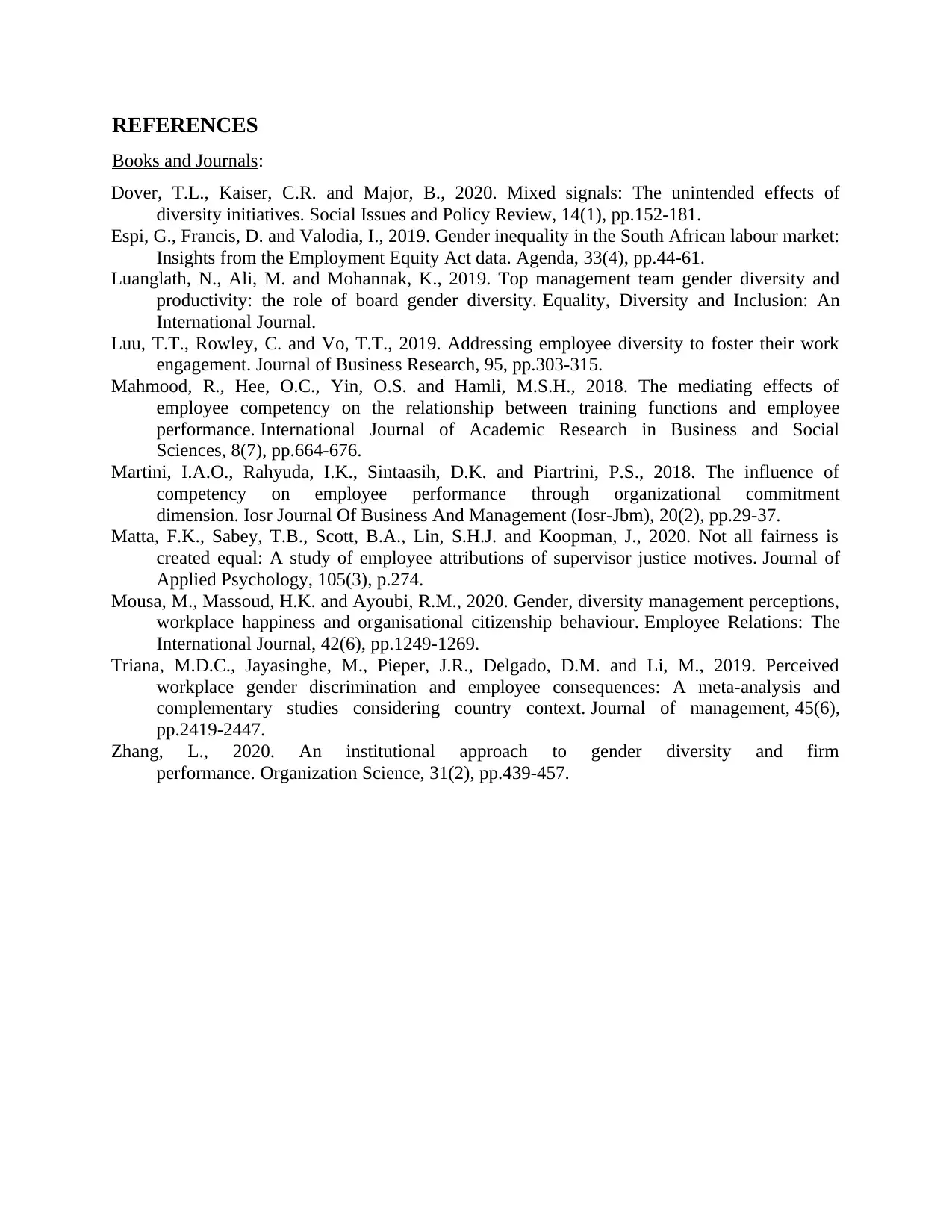
REFERENCES
Books and Journals:
Dover, T.L., Kaiser, C.R. and Major, B., 2020. Mixed signals: The unintended effects of
diversity initiatives. Social Issues and Policy Review, 14(1), pp.152-181.
Espi, G., Francis, D. and Valodia, I., 2019. Gender inequality in the South African labour market:
Insights from the Employment Equity Act data. Agenda, 33(4), pp.44-61.
Luanglath, N., Ali, M. and Mohannak, K., 2019. Top management team gender diversity and
productivity: the role of board gender diversity. Equality, Diversity and Inclusion: An
International Journal.
Luu, T.T., Rowley, C. and Vo, T.T., 2019. Addressing employee diversity to foster their work
engagement. Journal of Business Research, 95, pp.303-315.
Mahmood, R., Hee, O.C., Yin, O.S. and Hamli, M.S.H., 2018. The mediating effects of
employee competency on the relationship between training functions and employee
performance. International Journal of Academic Research in Business and Social
Sciences, 8(7), pp.664-676.
Martini, I.A.O., Rahyuda, I.K., Sintaasih, D.K. and Piartrini, P.S., 2018. The influence of
competency on employee performance through organizational commitment
dimension. Iosr Journal Of Business And Management (Iosr-Jbm), 20(2), pp.29-37.
Matta, F.K., Sabey, T.B., Scott, B.A., Lin, S.H.J. and Koopman, J., 2020. Not all fairness is
created equal: A study of employee attributions of supervisor justice motives. Journal of
Applied Psychology, 105(3), p.274.
Mousa, M., Massoud, H.K. and Ayoubi, R.M., 2020. Gender, diversity management perceptions,
workplace happiness and organisational citizenship behaviour. Employee Relations: The
International Journal, 42(6), pp.1249-1269.
Triana, M.D.C., Jayasinghe, M., Pieper, J.R., Delgado, D.M. and Li, M., 2019. Perceived
workplace gender discrimination and employee consequences: A meta-analysis and
complementary studies considering country context. Journal of management, 45(6),
pp.2419-2447.
Zhang, L., 2020. An institutional approach to gender diversity and firm
performance. Organization Science, 31(2), pp.439-457.
Books and Journals:
Dover, T.L., Kaiser, C.R. and Major, B., 2020. Mixed signals: The unintended effects of
diversity initiatives. Social Issues and Policy Review, 14(1), pp.152-181.
Espi, G., Francis, D. and Valodia, I., 2019. Gender inequality in the South African labour market:
Insights from the Employment Equity Act data. Agenda, 33(4), pp.44-61.
Luanglath, N., Ali, M. and Mohannak, K., 2019. Top management team gender diversity and
productivity: the role of board gender diversity. Equality, Diversity and Inclusion: An
International Journal.
Luu, T.T., Rowley, C. and Vo, T.T., 2019. Addressing employee diversity to foster their work
engagement. Journal of Business Research, 95, pp.303-315.
Mahmood, R., Hee, O.C., Yin, O.S. and Hamli, M.S.H., 2018. The mediating effects of
employee competency on the relationship between training functions and employee
performance. International Journal of Academic Research in Business and Social
Sciences, 8(7), pp.664-676.
Martini, I.A.O., Rahyuda, I.K., Sintaasih, D.K. and Piartrini, P.S., 2018. The influence of
competency on employee performance through organizational commitment
dimension. Iosr Journal Of Business And Management (Iosr-Jbm), 20(2), pp.29-37.
Matta, F.K., Sabey, T.B., Scott, B.A., Lin, S.H.J. and Koopman, J., 2020. Not all fairness is
created equal: A study of employee attributions of supervisor justice motives. Journal of
Applied Psychology, 105(3), p.274.
Mousa, M., Massoud, H.K. and Ayoubi, R.M., 2020. Gender, diversity management perceptions,
workplace happiness and organisational citizenship behaviour. Employee Relations: The
International Journal, 42(6), pp.1249-1269.
Triana, M.D.C., Jayasinghe, M., Pieper, J.R., Delgado, D.M. and Li, M., 2019. Perceived
workplace gender discrimination and employee consequences: A meta-analysis and
complementary studies considering country context. Journal of management, 45(6),
pp.2419-2447.
Zhang, L., 2020. An institutional approach to gender diversity and firm
performance. Organization Science, 31(2), pp.439-457.
1 out of 8
Related Documents
Your All-in-One AI-Powered Toolkit for Academic Success.
+13062052269
info@desklib.com
Available 24*7 on WhatsApp / Email
![[object Object]](/_next/static/media/star-bottom.7253800d.svg)
Unlock your academic potential
Copyright © 2020–2026 A2Z Services. All Rights Reserved. Developed and managed by ZUCOL.



